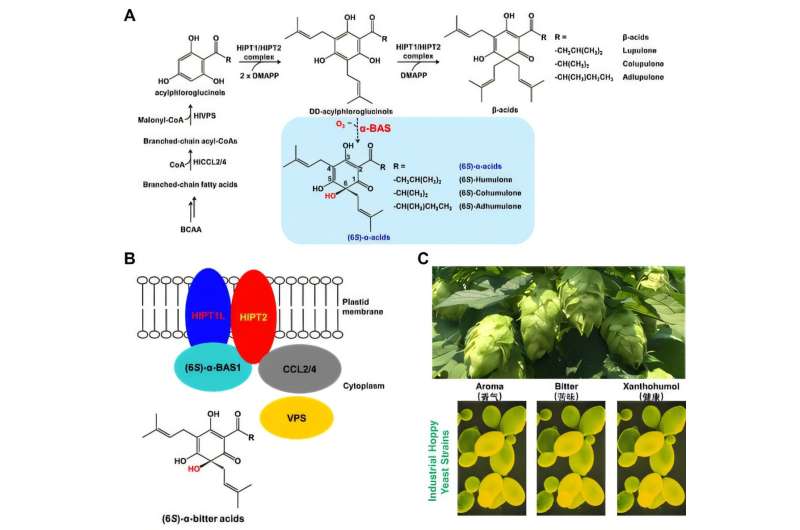Science
Researchers Uncover Key Enzyme in Hops That Shapes Beer’s Taste

Hops play a crucial role in beer brewing, contributing both flavor and aroma to the beverage. A recent study led by Prof. Wang Guodong from the Institute of Genetics and Developmental Biology (IGDB) at the Chinese Academy of Sciences has made significant strides in understanding how hops produce α-bitter acids, which are central to the characteristic bitterness of beer. This breakthrough, published in the journal Plant Communications, provides insight into the biosynthetic pathways that define the unique flavor profiles of this popular beverage.
Hops are covered in tiny glandular trichomes that synthesize various specialized metabolites. These compounds include terpenes, which contribute the aromatic qualities of beer, and xanthohumol, known for its antioxidant properties. Historically, α-bitter acids also served as natural preservatives, enhancing the shelf life of beer before modern brewing technologies were developed.
While the biosynthetic pathway for α-bitter acids had been largely mapped, the enzyme responsible for the final step, known as α-bitter acid synthase (α-BAS), had not been functionally verified for over a decade. This gap in knowledge persisted despite multiple candidate genes being identified. To address this challenge, the research team employed a sensitive liquid chromatography–mass spectrometry (LC–MS) detection method to differentiate between the two chiral forms of α-bitter acids—6S and 6R.
November 5, 2025, marked a significant advancement when the researchers discovered that hop glandular trichomes predominantly accumulate the 6S-type α-bitter acid. Their investigation revealed that the precursor, deoxy-α-bitter acid, undergoes spontaneous oxidation when exposed to air, leading to a racemic mixture of both 6S and 6R forms. This spontaneous reaction had previously obstructed efforts to confirm the function of α-BAS.
After overcoming this technical barrier, the team established a yeast heterologous expression system to systematically test over ten candidate genes. Their findings identified HlMO18 as the enzyme that specifically catalyzes the oxidation of deoxy-α-bitter acid, leading to the predominant production of the 6S form. Additionally, the researchers pinpointed the key amino acid residues essential for this enzyme’s activity.
Further mechanistic analyses illustrated that the 6S-type α-bitter acid synthase forms a metabolic complex with upstream enzymes. This complex interaction explains the selective accumulation of the 6S form within hop glandular trichomes. This comprehensive mapping of α-bitter acid biosynthesis not only clarifies the chemical processes involved but also holds significant implications for the brewing industry.
Looking ahead, the research team plans to leverage synthetic biology to engineer industrial yeast strains capable of producing “hoppy beer” that retains the authentic flavors of hops without utilizing the actual plant. This innovative approach could lead to reduced production costs and the ability to create more customized, flavor-rich beers, setting the stage for a new era of brewing innovation.
The implications of this research extend beyond academic interest; they could revolutionize how beers are crafted in the future. The ability to synthesize these flavors more efficiently offers brewers the opportunity to experiment with various profiles while maintaining cost-effective production methods.
For further details, refer to the study by Chengyong Feng and colleagues, titled “A flavin-dependent monooxygenase favors the formation of (6S)-α-bitter acids in hop glandular trichomes,” published in Plant Communications in 2025.
-

 Science2 weeks ago
Science2 weeks agoInventor Achieves Breakthrough with 2 Billion FPS Laser Video
-

 Top Stories3 weeks ago
Top Stories3 weeks agoCharlie Sheen’s New Romance: ‘Glowing’ with Younger Partner
-

 Entertainment3 weeks ago
Entertainment3 weeks agoDua Lipa Aces GCSE Spanish, Sparks Super Bowl Buzz with Fans
-

 Business3 weeks ago
Business3 weeks agoTyler Technologies Set to Reveal Q3 Earnings on October 22
-

 Health3 weeks ago
Health3 weeks agoCommunity Unites for 7th Annual Into the Light Walk for Mental Health
-

 Health3 weeks ago
Health3 weeks agoCurium Group, PeptiDream, and PDRadiopharma Launch Key Cancer Trial
-

 Entertainment3 weeks ago
Entertainment3 weeks agoRed Sox’s Bregman to Become Free Agent; Tigers Commit to Skubal
-

 Entertainment3 weeks ago
Entertainment3 weeks agoMother Fights to Reunite with Children After Kidnapping in New Drama
-

 World3 weeks ago
World3 weeks agoR&B Icon D’Angelo Dies at 51, Leaving Lasting Legacy
-

 Health3 weeks ago
Health3 weeks agoNorth Carolina’s Biotech Boom: Billions in New Investments
-

 Science3 weeks ago
Science3 weeks agoNorth Carolina’s Biotech Boom: Billions Invested in Manufacturing
-

 Top Stories3 weeks ago
Top Stories3 weeks agoDisney+ Launches Chilling Classic ‘Something Wicked’ Just in Time for October









